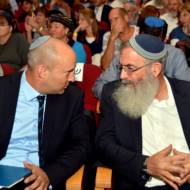
Founded in 1995 in the wake of the assassination of Prime Minister Yitzhak Rabin by leading rabbinical figures of the Religious Zionist movement, the Tzohar rabbinical organization’s original mandate was to unite divided elements within Israeli society at a time of unprecedented internal tension.
At its annual summer conference in Jerusalem, attended by more than 1,000 people, Rabbi David Stav, one of Tzohar’s original founders, explained the changes in the organization’s activities over the past 20 years, although the mandate remains the same.
“Our original goal was to promote educational and cultural programs that could be accessible to all Israeli Jews so that Jewish tradition and practice would be a uniting factor in our society,” he said. “While we have achieved much in that regard and established programs that have reached hundreds of thousands of Israelis, we know that much remains to be accomplished in terms of creating a more unified Israeli culture.”
Rabbi Yuval Cherlow, chair of Tzohar’s Ethics Committee, discussed the conflict between the public’s “right to know” versus national security interests and how that debate is resolved through Jewish law and morality. He explored how this issue is a central point of focus in defining Jewish identity by uncovering our connection both to the land and the nation while also remaining true to our ancient appreciation for religious values and traditions. “While these two values might seemingly be in conflict with each other, the modern Israeli experience has proven that every such challenge can be resolved and this is the great opportunity of living in and governing a nation in the 21st century while still embracing the lessons of the past.”
The conference, which attracted senior political personalities, took place amidst a period of internal debate over the place of religion and rabbis in the public discourse. “Our message has always been that the role of a rabbi is not simply to teach and inspire, but to also be relevant to the greater society,” said Yakov Gaon, executive vice-president of Tzohar. “This requires an approach where we have worked to make religion accessible to young Israelis without alienating them, which is all too often the case when it comes to the interface between Jewish practice and the Israeli public.”
The Israeli public is largely secular, however, “the past 20 years have proven that despite the challenges and tensions which remain in Israel, there is a thirst among the general Jewish population to be educated and embrace their Judaism,” said Rabbi Stav. “In viewing such a large gathering of Israeli Jews coming together to be educated and confront the key issues of today gives us great pride and confidence in the importance of Tzohar’s work. It also reinforces the belief that together we can create a better and stronger Jewish society and help Israel achieve its true potential as the modern state of all the Jewish people.”
By: United with Israel Staff
(With files from Tzohar)
Subscribe to Our FREE Newsletter for More Great Stories Like This One
United with Israel publishes stories like this every day. We believe that our work allows a more balanced view of Israel to emerge. With so much anti-Israel media bias out there from outlets like CNN and the BBC, helping the Holy Land means getting our message out to as many people as possible.
You can help.
Subscribe to our free newsletter to ensure that you get the latest and best stories from United with Israel. Together we can make a difference, and it starts with communication.
CLICK HERE TO SUBSCRIBE TO OUR FREE NEWSLETTER
Source: United with Israel


